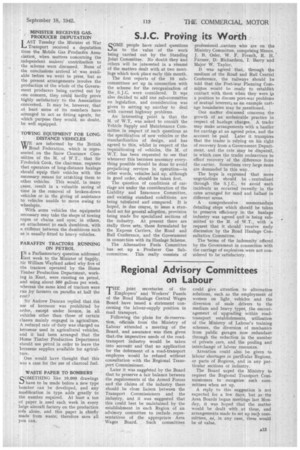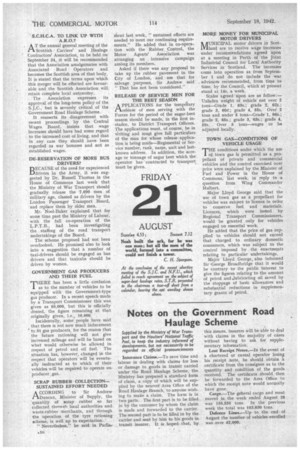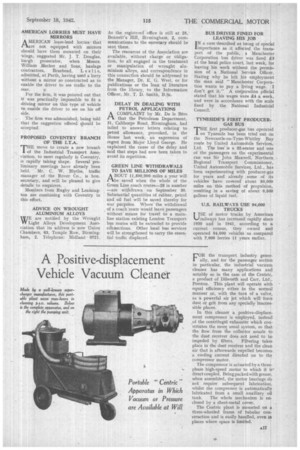Regional Advisory Committees on Labour
Page 17

Page 18

Page 19

If you've noticed an error in this article please click here to report it so we can fix it.
T"joint secretaries of the Employers' and Workers' Panels of the Road Haulage Central Wages Board have issued a statement concerning the labour-supply position in road transport.
Following the plans for de-reservation, officials from the Ministry of Labour attended a meeting of the Board, and assurance was then given that•the imperative needs of the roadtransport industry would be taken into account and that no application for the deferment of a road-transport employee would be refused without consultation with the Regional Transport Commissioner.
Later it was suggested by the Board that to preserve a fair balance between the requirements of the Armed Forces and the claims of the industry there should be close liaison between the Transport Commissioners and the industry, and it was suggested that this could best be maintained by the establishment in each Region of an advisory committee to include representatives of the appropriate Area Wages Board. . Such committees could give attention to alternative solutions, such as the employment of women on light vehicles and the diversion of male drivers to the medium and heavy types, the encouragement of upgrading within roadtransport establishments, utilization of the Ministry of Labour's training schemes, the diversion of mechanics from public garages now redundant through the reduction in the number of private cars, and the pooling and interchange of labour resources.
Attention could also be given to labour shortages in particular Regions, or parts of Regions, and in any particular sections of industry.
The Board urged the Ministry to request the Regional Transport Commissioners to recognize such committees when set up.
A reply to this suggestion is not expected for a few days, but :as •the Area Boards began meetings last Monday, it was hoped that the matter would be dealt with at these, and arrangements made to set up such cornmittees, as, in any case, these weal be of value.
S.C.H.C.A. TO LINK UP WITH A.R.O.
AT the annual general meeting of the Scottish Carriers' and Haulage Contractors' Association, to be held on September 24, it will be recommended that the Association amalgamates with Associated Road Operators and becomes the Scottish area of that body, It is stated that the terms upon which this merger will be effected are favourable and the Scottish Association will retain complete local autonomy.
The Association expresses its approval of the long-term policy of the S.J.C., but is severely critical of the Government Road Haulage Scheme, It reasserts its disagreement with recent proceedings by the Central Wages Board, insists that wage increases should have had some regard to the increased cost of living, and that in any case they should have been regarded as war bonuses and not as established wages.
DE-RESERVATION OF MORE BUS DRIVERS?
BECAUSE of the need for experienced drivers in the Army, it was suggested by Dr. Russell Thomas in the House of Commons last week that the Ministry of War Transport should gradually release the 7,690 men of military age, classed as drivers by the London Passenger Transport Board, and replace-them by older men.
Mr: Noel-Baker explained that for some time past the Ministry of Laboui, with the full co-operation of the L.P.T,B., had been investigating the staffing of the road transport undertakings of the Board.
The scheme proposed had not been overlooked. He promised also to look into a suggestion that a number of taxi-drivers should be engaged as bus drivers and that taxicabs should be driven by women.
GOVERNMENT GAS PRODUCERS AND THEIR FUEL THERE has been a little confusion as to the number of vehicles to be equipped with the Government-type gas producer. In a recent speech made by a Transport Commissioner this was given as 50,000, but this is officially denied, the figure remaining at that originally given, i.e., 10,000.
Incidentally, some people have said that there is not now much inducement ' to fit gas producers, for the reason that the future rationing will not give increased mileage and will be based on what would otherwise be allowed in respect of petrol and oil fuel. The situation has, however, changed in the respect that operators will be eventually insfructed as to which of their vehicles will be required to operate on producer gas.
SCRAP RUBBER COLLECTION— SUSTAINED EFFORT NEEDED A CCORDING to Sir Andrew .1–Duncan, Minister of Supply, the quantity of scrap rubber so far collected throneh local authorities and waste-rubber merchants, and through the operation of the tyre rationing scheme, is, well up to expectation.
" Nevertheless," he said in Parlia ment last week, " sustained efforts are needed to meet our continuing requirements." He added that in co-operation with the Rubber, Control, the Motor Agents' Association was arranging an intensive campaign among its members.
Asked if there was any proposal to take up the rubber pavement in the City of London, and use that for salvage purposes, Sir Andrew said " That has not been considered."
RELEASE OF SERVICE MEN FOR THE BEET SEASON
APPLICATIONS for the tempi:fiery release of men serving with the Forces for the period of the sugar-beet season should be made, in the first instance, to District Transport Officers. The applications must, of course, be in writing and must give full particulars of the man for whose release application is being made—Regimental or Service number, rank, name, unit and lastknown address. In addition, the acreage or tonnage of sugar beet which the operator has -contracted to transport must be given.
MORE MONEY FOR MUNICIPAL MOTOR DRIVERS 1./1UNICIFAL motor drivers in Scot/VIland are to receive wage increases under recommendations agreed upon at a meeting in Perth of the Joint Industrial Council for Local Authority Services in Scotland. The increases come into operation as from September 1 and do not include the war advances recommended, from time to time, by the Council, which at present stand at 14s. a week.
Scales agreed upon are as follow:— Unladen weight of vehicle not over 2 tons—Grade 1, 63s.; grade 2, 62s.; grade 3, 60e.; grade 4, 55s. Over 2 tons and under 5 tons—Grade 1, 66s.; grade 2, 65s.; grade 3, 63s.:. grade 4, 59s. Over 5 tons—wages to be adjusted locally.
TOWN GAS—CONDITIONS OF VEHICLE USAGE
THE conditions under which the use of town gas is permitted as a propellant of private and commercial vehicles and the control exercised over price were explained by the Minister of Fuel and Power in the House of Commons, last week, in reply to a question from Wing Commander Hulbert.
Major Lloyd George said that the use of town gas as a propellant for vehicles was subject to licence in order to conserve fuel and materials. Licences, which were issued by Regional Transport Commissioners, would be granted only for vehicles engaged on essential work.
He added that the price of gas supplied to vehicles should not exceed that charged to ordinary domestic consumers, which was subject to the control imposed by the enactments relating to particular undertakings.
Major Lloyd George. also informed Sir 'George Broadbridge that it would be contrary to, the public interest to give the figures relating to the amount of petrol andJubricating oil saved by the stoppage of basic allowances and substantial reductions in supplemen
tary grants of petrol. " AMERICAN LORRIES MUST HAVE MIRRORS MERICAN lease-lend lorries that 1"%are not equipped with mirrors should have them mounted on their wings, suggested Mr. J. T. Douglas, burgh prosecutor, when " Messrs. William _Mecher and Sons, haulage contractors, Eraehead, Lesli e, admitted, at Perth, having used a lorry without a mirror so constructed as to enable the driver to see traffic to the rear. • For the firm, it was pointed out that it was practically impossible to fit a driving mirror on this type of vehicle to enable the driver to see on his off side.
The firm was admonished, being told that the suggestion offered should be accepted.
PROPOSED COVENTRY BRANCH OF THE I.T.A.
'THE move to create a new branch 1 of the Industrial Transport Association, to meet regularly in Coventry, is rapidly taking shape. Several preliminary meetings have already been held. Mr. C. W. Blythe, traffic manager of the Rover Co., is hon. secretary, and will be pleased to give details to enquirers.
Members from Rugby and Learnington are combining with Coventry in this effort.
ADVICE ON WROUGHT ALUMINIUM ALLOYS are notified by the Wrought Light Alloys Development Association that its address is now Union Chambers, 63, Temple Row, Birmingham, 2. Telephone: Midland 0721. As the registered office is still at 25, Bennett's Hill, Birmingham, 2, communications to the secretary should be sent there.
The resources of the Association are available, without charge or obligation, to all engaged in the treatment or manipulation of wrought aluminium alloys, and correspondence in this connection should be addressed to the Manager, Dr. E. G. West, or for publications or the loan of literature from the library, to the Information Officer, Mr_ T. D. Smith, B.Sc.
DELAY IN DEALING WITH PETROL APPLICATIONS
A COMPLAINT by Mr. De le Bern .1-1. that the Petroleum Department. 31, Calthorpe Road, Birmingham, had failed to answer letters relating to petrol allowance, provoked, in the House last week, an expression of regret from Major Lloyd George. He explained the cause of tbe delay and said that steps had now been taken to avoid its repetition.
GREEN LINE WITHDRAWALS TO SAVE MILLIONS OF MILES
ABOUT 11,500,000 miles a year will be saved when the whole of the , Green Line coach routes-28 in number —are withdrawn on September 30. Substantial quantities of rubber, petrol and oil fuel will be saved thereby for war purpo'ses. Where the withdrawal , of a coach route would leave passengers without means for travel to a mainline station existing London Transport bus routes will he extended to provide ccrtmections. Other local bus services will be strengthened to carry the essen7 tial traffic displaced.
BUS DRIVER FINED FOR LEAVING HIS JOB IN a case described as being of special !importance as it affected the transport of the public, a Manchester Corporation bus driver was fined £3 at the local police court, last week, for leaving his work without the permission of a National Service Officer. Stating why he left his employment the man said "Manchester Corporation wants to pay a living wage. I don't get it." A corporation pfficial stated that his wages were £4 a week, and were in accordance with the scale fixed by the National Industrial Council.
TYNESIDE'S FIRST PRODUCER. GAS BUS THE first producer-gas bus operated 1 on Tyneside has been tried out on the Newcastle-on-Tyne-Whitley Bay route by United Automobile Services, Ltd. The bus' is a 32-seater and one of the passengers on the experimental run was Sir John Maxwell. Northern Regional Transport Commissioner. United Automobile Services, Ltd., has been experimenting with producer-gas for years and already some of its vehicles have covered about 80,000 miles on this method of propulsion, resulting in a saving of about 9,500 gallons of liquid fuel.
U.S. RAILWAYS USE 94,000 TRUCKS USE of motor trucks by American railways has increased rapidly since 1930 and in 1941. according to a current census, they owned and operated 94,000 vehicles as compared with 7,000 lorries 11 years earlier.




















































